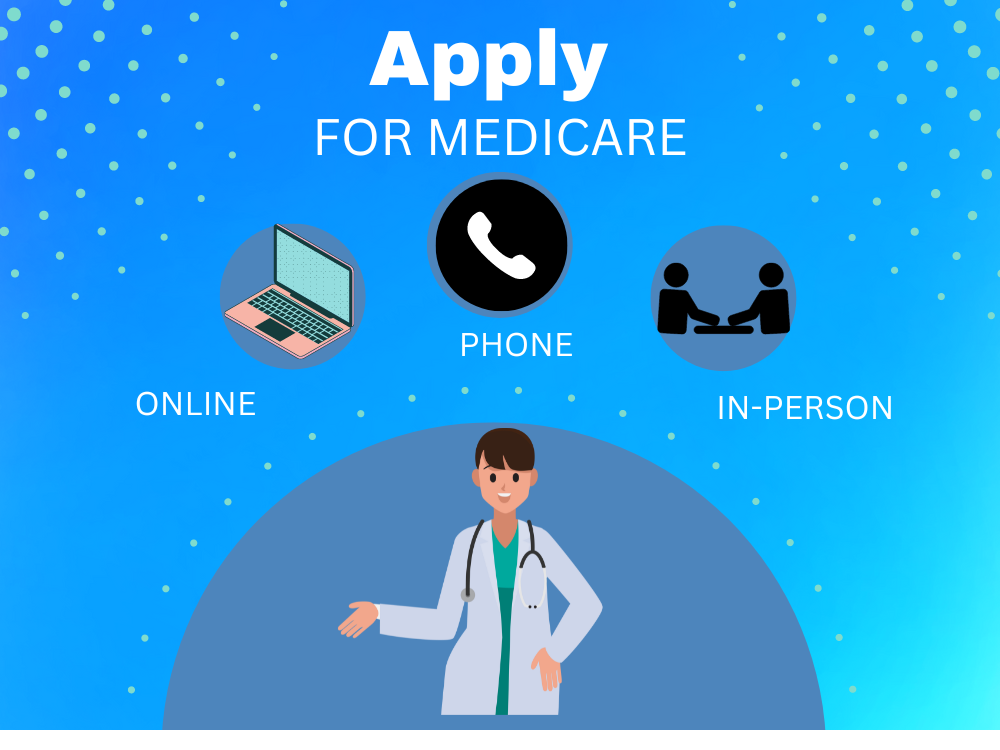
When and How to Apply for Medicare?
You have the option to enrol in Medicare either by contacting Social Security directly or by being automatically enrolled when you turn 65.
If you’re receiving Social Security benefits
If you’ve been receiving Social Security benefits for at least four months before reaching the age of 65, you’ll automatically receive both Medicare Part A and Part B. However, you can choose to delay Part B if you have other qualifying health coverage.
For those who have applied for Social Security but haven’t received benefits for the required duration, automatic enrolment in Medicare Part A will occur upon eligibility, and you’ll need to apply for Part B separately.
If you’re not getting Social Security yet
If you are not yet receiving Social Security benefits, you can apply for Medicare in one of three ways:
- Apply online through the Social Security website for a quick and efficient process.
- Call Social Security at 800-772-1213 (TTY 800-325-0778).
- Visit your local Social Security office, although it is recommended to schedule an appointment to avoid long wait times.

The online application typically takes less than 10 minutes, while visiting a local office without an appointment may result in extended wait times, so it’s advisable to plan accordingly.
If you’re disabled and under age 65
If you are under the age of 65 and disabled, Medicare is accessible for individuals receiving Social Security disability benefits (SSDI). Typically, automatic enrollment in Medicare occurs after 24 months of eligibility for disability benefits. It’s essential to apply for Medicare during your initial enrollment period, which begins three months before the month you turn 65 and ends three months after your birthday month. This enrollment window ensures you avoid any late enrollment penalties and have coverage when you need it most. Apply for Medicare to secure your health care benefits and access necessary medical services.
For those diagnosed with Lou Gehrig’s disease (ALS), also known as amyotrophic lateral sclerosis, Medicare coverage is automatic and begins in the same month they receive their initial disability check. Individuals facing kidney failure, or end-stage renal disease, have the option to apply for Medicare, and coverage usually starts on the fourth month of dialysis treatments. Retroactive start dates, going back up to 12 months, are common, and under certain conditions, the waiting period may be waived.
Individuals with end-stage renal disease undergoing a kidney transplant are eligible for Medicare either in the month they are admitted for the transplant or for pre-transplant services.
When to sign up for Medicare
To ensure timely enrollment in Medicare, if you’re not automatically enrolled, it’s advisable to sign up during the three months preceding your 65th birthday. This ensures that your coverage commences on the first day of your birthday month, except if your birth date falls on the first day of the month, in which case coverage begins on the first day of the prior month.
Your initial enrollment period extends for seven months around your 65th birthday, encompassing the three months before your birthday month, your birthday month, and the three months after. If your birthday is on the first day of the month, your initial enrollment period covers the four months before your birthday month and two months after.
Applying for Medicare during your birthday month or the three months following will result in coverage starting the subsequent month. Missing this initial window means you may need to enroll during Medicare’s general enrollment period, but be aware that a permanent penalty may apply unless you maintain continuous coverage from a large employer group health insurance plan.
Applying during the general enrollment period
If you miss applying during your initial enrollment period for Medicare Parts A and B and are ineligible for a special enrollment period, you must wait for the general enrollment period to enroll. It’s important to note that this period is distinct from the annual open enrollment period, which occurs from Oct. 15 to Dec. 7 each year.
The general enrollment period takes place annually from Jan. 1 to March 31. However, coverage only starts the month after you sign up, and late penalties may be imposed. Additionally, you will be responsible for covering any healthcare costs incurred during the period when you were uninsured before your coverage begins.

Medicare late enrollment penalties
Failure to enroll in Medicare on time may result in late fees.
For Medicare Part A, a 10% penalty applies if not purchased during the initial enrollment period, lasting twice the duration of delayed enrollment.
Part B incurs a 10% permanent premium increase for each 12-month gap without coverage.
Part D imposes a lasting penalty if without drug coverage for 63+ days post-enrollment period, calculated as 1% of the “national base beneficiary premium” multiplied by months without coverage, with no cap.
This recalculated penalty persists annually. Timely enrollment is crucial to avoid these permanent penalties and ensure cost-effective Medicare coverage.

What happens after you sign up for Medicare

Once you’ve enrolled in Medicare, you’ll receive a welcome kit by mail, providing information on how Medicare Parts A and B function and guidance on exploring additional coverage options. Along with this kit, you’ll receive your distinctive red, white, and blue Medicare card, which is essential and should not be discarded as junk mail.
The effective date of your Medicare coverage depends on when you sign up:
- If you enroll before the month of your 65th birthday, coverage begins in the month you turn 65.
- Enrolling in the month you turn 65 or during the three months following ensures coverage starts the next month.
- Signing up during the general enrollment period from Jan. 1 to March 31 results in coverage beginning the month after enrollment.
- If eligible for a special enrollment period, coverage starts the next month.
Note: If your birthday falls on the first day of the month, your coverage initiates on the first day of the month before your birthday month. For example, if you turn 65 on Aug. 1, your coverage begins on July 1. Always verify your specific enrollment timeline with Medicare directly if you’re uncertain.
Expert Guidance For More Information
Are you seeking help to get clarity on your healthcare coverage choices? Allow our team of experts to guide you in understanding your basic benefits, and then we can assist you in selecting the right supplemental plan. Reach out to us today!
The Medicare program comprises Part A, B, C, and D. It's important to note that Part C, D, and Medigap plans are offered by private insurance carriers, not the federal government.
You can opt for both a Medigap plan and a Part D plan, or you can choose an Advantage plan, only if you are enrolled in in Medicare Part A and Part B.



Have any questions?
 Faq Questions
Faq Questions
Have any questions And answers
What is insurance ?
Insurance is a contract between an individual or an organization (the policyholder) and an insurance company, where the policyholder pays a premium in exchange for protection..
What is the purpose of insurance ?
The purpose of insurance is to protect individuals, businesses, and other entities from financial losses due to unexpected events or accidents. Insurance provides a way to transfer the risk of loss..
How does insurance work ?
Insurance works by pooling together the risks of many individuals or organizations and distributing the financial costs of unexpected losses among the members of the pool. Insurance companies..

